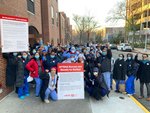A few of our stories and columns are now in front of the paywall. We at The Chief-Leader remain committed to independent reporting on labor and civil service. It's been our mission since 1897. You can have a hand in ensuring that our reporting remains relevant in the decades to come. Consider supporting The Chief, which you can do for as little as $3.20 a month.


The clock is ticking.
About 10,000 private-sector nurses are set to strike Jan. 9 if they do not settle contract agreements that include significant raises and safe-staffing policies.
Although the New York State Nurses Association has worked out tentative deals with NewYork-Presbyterian Hospital, Richmond University Medical Center and Maimonides Medical Center, negotiations are still underway with five other hospitals, the union announced during a press briefing Thursday.
NYSNA’s president, Nancy Hagans, called on the remaining hospitals “to follow the lead of NewYork-Presbyterian, Maimonides and Richmond and come to the table.
“We still have time,” she said during the press conference.
Contracts have not yet been reached at including Montefiore Medical Center, BronxCare, Flushing Hospital, Mount Sinai Hospital and Mount Sinai Morningside and West, affecting 10,000 nurses.
Pat Kane, NYSNA’s executive director, said that one main reason for a contract impasse with the remaining hospitals is because of a lack of plans to enforce safe-staffing ratios. “A big problem with staffing, even where we have contracts where we have negotiated appropriate ratios, is that they’re not adhered to,” the union leader said during the briefing.
There has been some progress — each of the hospitals, except for Flushing Hospital, have agreed not to cut the nurses’ health insurance benefits.
But in preparation for a potential strike, the Mount Sinai Health System has begun slashing services. In a memo, hospital’s leadership said the hospital had started canceling elective surgeries, transferring babies from its neonatal intensive care units and diverting ambulances from its hospitals.
“We regret that Mount Sinai is choosing to spend time and money on strike planning instead of negotiating a fair contract that delivers safe patient staffing and better wages to recruit and retain nurses,” Hagans said. Mount Sinai administrators did not return a request for comment.
But Joe Solmonese, a senior vice president at Montefiore, said that NYSNA “refuses to come to an agreement” despite making an offer comparable to the one reached with NewYork-Presbyterian, which includes raises of 18 percent and fully funded health insurance.
“Montefiore lost nearly $600 million over the course of the pandemic. Last year alone, we lost $200 million. NewYork-Presbyterian, on the other hand, posted net profits of roughly $200 million in 2022," he said in a statement. "Despite the financial challenges that we continue to face, we believe that our nurses’ work has equal value to that of their colleagues in neighboring systems.”
NYSNA disputed Montefiore’s claims of financial woes, stating that “two out of the top five highest paid hospital executives in the state were from Montefiore.… If Montefiore can afford to pay its executives so much, they can hardly cry broke when it comes to negotiating a fair contract with frontline nurses."
As hospitals are slammed with a “tripledemic” of Covid, flu and RSV patients, improving patient care, particularly by increasing staffing, has been the main goal during negotiations, NYSNA officials emphasized. The union's leaders described staffing shortages in the neonatal unit at Mount Sinai, where nurses often care for two NICU babies instead of one, and the frequent use of hallway beds at Montefiore due to overcrowding.
Want ratios in reality, not just on paper
“There are many outstanding issues at these facilities regarding how they intend to enforce the language that they’ve agreed to. So at many of the facilities that are still at the bargaining table, that is what they are trying to achieve — not just ratios on paper,” Kane, the union’s executive director, said.
NewYork-Presbyterian was the first to settle a tentative agreement for 4,000 nurses hours before their contract was set to expire Dec. 31. The hospital’s nurses are expected to complete a contract ratification vote this weekend. The union reached deals with Richmond University Medical Center and Maimonides Medical Center on the night before the briefing; the ratification vote for Maimonides nurses is set to begin Friday, NYSNA announced.
Hagans stated that the tentative agreements with Richmond Medical Center, which covers 550 nurses, and at Maimonides, which covers 1,300 nurses, follow the pattern set by the deal reached with NewYork-Presbyterian. The agreements include 7-percent, 6-percent and 5-percent raises over three years and improved staffing ratios in several units, including the emergency department.
“We hope these agreements set a new, higher standard for New York City safety-net hospitals,” Hagans said.
The contracts for more than 17,000 private-sector nurses expired Dec. 31. NYSNA gave a 10-day strike notice to eight hospitals where nurses authorized a strike vote. Nurses at four other facilities, including the Brooklyn Hospital Center and Wyckoff Heights Medical Center, are still conducting strike authorization votes.
clewis@thechiefleader.com
Comments
No comments on this item Please log in to comment by clicking here